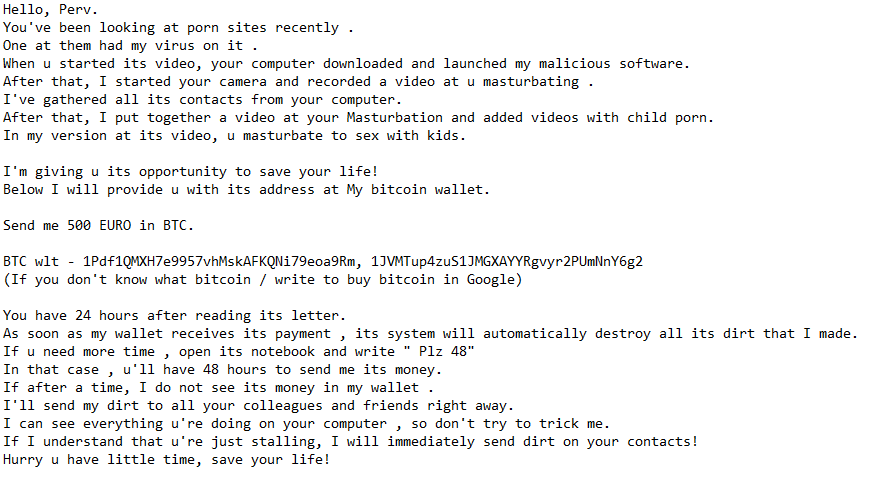What is the “Hello Perv” sextortion scam email
The “Hello Perv” email falls into the sextortion scam email category. The email claims that your computer is infected with a virus, which supposedly allowed the sender to make explicit videos of you. The sender threatens to release the video unless you agree to pay 500 euros. It goes without saying that the contents of the email are fake. The video does not exist and there is no reason to pay anything.
Sextortion emails are very generic scams that threaten to release non-existent videos of users watching pornography if they do not agree to pay a certain sum of money. There are different variations of these scams but they all usually follow a more or less identical pattern.
This “Hello Perv” sextortion scam email claims that you, the recipient, have recently visited pornography websites. Supposedly, some malware was hidden on those websites and it downloaded onto your computer. The supposed hacker claims to have been able to turn on your camera and microphone, which allowed them to make an explicit video of you. They also claim to have stolen all contacts from your computer. To further alarm you, they claim to have edited the video to make it seem like you are watching child pornography videos. To not send the video to all your contacts, the sender demands 500 euros in bitcoins to be transferred to the provided wallet address. A time limit of 24 hours is given. Supposedly, if you pay, they will delete the video. If you do not pay, they threaten to release the video.
As already mentioned, the contents of this email are fake. While the email may seem alarming, your computer is not infected with malware nor is there an explicit video of you in the hands of cybercriminals. Sending money to these scammers would simply be a waste. You can remove “Hello Perv” sextortion scam email from your inbox.
Here is the full text from the “Hello Perv” sextortion scam email:
Subject: You are my victim.
Hello, Perv.
You’ve been looking at porn sites recently .
One at them had my virus on it .
When u started its video, your computer downloaded and launched my malicious software.
After that, I started your camera and recorded a video at u masturbating .
I’ve gathered all its contacts from your computer.
After that, I put together a video at your Masturbation and added videos with child porn.
In my version at its video, u masturbate to sex with kids.I’m giving u its opportunity to save your life!
Below I will provide u with its address at My bitcoin wallet.Send me 500 EURO in BTC.
BTC wlt – 1Pdf1QMXH7e9957vhMskAFKQNi79eoa9Rm, 1JVMTup4zuS1JMGXAYYRgvyr2PUmNnY6g2
(If you don’t know what bitcoin / write to buy bitcoin in Google)You have 24 hours after reading its letter.
As soon as my wallet receives its payment , its system will automatically destroy all its dirt that I made.
If u need more time , open its notebook and write ” Plz 48″
In that case , u’ll have 48 hours to send me its money.
If after a time, I do not see its money in my wallet .
I’ll send my dirt to all your colleagues and friends right away.
I can see everything u’re doing on your computer , so don’t try to trick me.
If I understand that u’re just stalling, I will immediately send dirt on your contacts!
Hurry u have little time, save your life!
Sextortion emails rely on scaring users enough to make rash decisions. The email is written in a very mocking tone and uses threatening language. These scare tactics are effective, especially when the sender mentions making it seem like the user was watching child pornography. The idea that users’ contacts could receive a video showing child abuse associated with them is enough to convince some users to make payments.
Another common and effective scare tactic is revealing users’ passwords. While this “Hello Perv” sextortion scam email does not do this, some sextortion scams do include passwords users use. This is an effective tactic because users who are not aware of sextortion scams would wonder how the sender was able to steal the password if not because malware is installed on their computer. In reality, passwords and email addresses are stolen during cyber attacks and end up on hacker forums. When a service does not secure passwords properly, they can easily be stolen during a cyberattack. Unfortunately, this happens quite often.
Site Disclaimer
WiperSoft.com is not sponsored, affiliated, linked to or owned by malware developers or distributors that are referred to in this article. The article does NOT endorse or promote malicious programs. The intention behind it is to present useful information that will help users to detect and eliminate malware from their computer by using WiperSoft and/or the manual removal guide.
The article should only be used for educational purposes. If you follow the instructions provided in the article, you agree to be bound by this disclaimer. We do not guarantee that the article will aid you in completely removing the malware from your PC. Malicious programs are constantly developing, which is why it is not always easy or possible to clean the computer by using only the manual removal guide.

